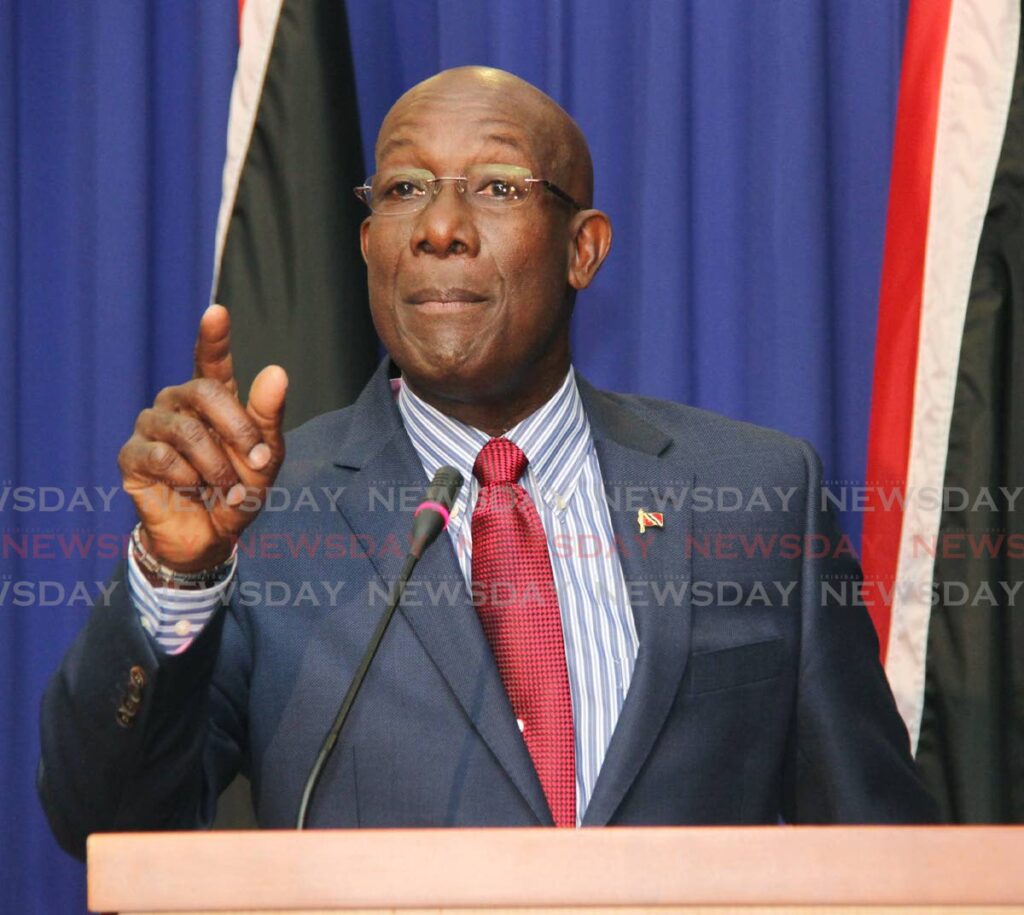PM challenges UNC to support change in acting CoP selection process

The Prime Minister has challenged the Opposition to support the government in changing Section 123 of the Constitution, which lays out the process of selecting and appointing a Police Commissioner and Deputy Police Commissioner.
He was speaking during Parliament on Friday during debate on the appointment of Mc Donald Jacob as Acting Police Commissioner and Earla Christopher and Wendell Williams as Acting Deputy Police Commissioners.
The debate became heated when Oropouche East Mp Dr Roodal Moonilal said he thought Williams had political leanings because he had congratulated the government on the appointment of Laventille West MP Fitzgerald Hinds, a former policeman, as National Security Minister. Moonilal also asked for the names of the other people who were considered for the posts and whether they were chosen on the basis of seniority.
The motions were passed, with the Opposition abstaining on each vote. Rowley said the government did not have the luxury of not making a decision on the matter.
“He wants to know why the other 11 names on the merit list are not before Parliament, that is the function of the Police Service Commission (PSC). Whether it is 11 or eleventeen, it is the PSC that looks at the crop and sends it to the President to come to this house.
"And all we are required to do is to approve or disapprove. And if we don’t approve, then the commission will send another name, and another name, and another name, that is the process. Why is an MP giving the impression that the Government hand-picked someone for political manipulation? As they say in Tobago parlance, the goat that bawling for the water, not he who want it.
“I made no position about seniority, I don’t know what the PSC took into account to select these officers. What I did say is that from their record in front of us, they are educated, qualified and experienced.
"What is happening here has its origin in Section 123 of the Constitution of TT. I want to ask the member, since he alluded to the fact that change is required there, whether in the sea of abstentions, whether he is prepared to tell this house that if we want to change section 123 to do what he says should be done, which is not to have to come here every time to make an appointment to a temporary position, an acting position, whether they will vote in support of Section 123.”
Earlier in the proceedings, the Opposition protested the debate on the matter, saying they had filed a motion on Thursday to annul the legal orders.
Moonilal said, “It is a breach of protocol, of convention, of practice, to debate the orders, when the motion is before the House to annul the orders which gave rise to this matter.”
House Speaker Bridgid Annisette-George said the motion was not placed on the order paper for several reasons. She said the motion was filed on Thursday and would be debated as soon as practicable but within the prescribed time.
“The orders are subject to a negative resolution of Parliament. They are statutory instruments and required to be annulled within the prescribed time of 40 days from the date on which the statutory instrument is published. These orders were made on November 25 and 26 respectively and published in the Gazette, so the prescribed time began on those days.”
She said Parliament being in recess did not affect the time for the prescribed period. She said all motions required notice before they could be moved, to give time for review, to ensure it accords with the standing orders, approval, and subsequent circulation to members to allow them to consider the motion and conduct research on its merits prior to the debate in Parliament.
“As far as private motions, which the motion you allude to is, this usually requires 12 days’ notice, under Standing Order 12 of the House of Representatives. However, given the nature of statutory instruments, subject to the negative resolution, which are in effect from the date of publication, Standing Order 80 (3) prescribes that the motion be debated as soon as practicable and before the expiration of the prescribed period.”
Annisette-George said as soon as practicable did not mean immediately or at the next available sitting, and the administrative processes would still need to be carried out. She said as the motion was substantive, members would need sufficient time to research it before debate.
“It cannot be debated on the same day as presented to the clerk. There are still days left before the prescribed period and the motion will be debated in the prescribed time. I rule there is no motion before this house, except the one we are about to embark upon. The motion was received yesterday afternoon and it is not on the order paper.”
Section 123 (2) of the Constitution says “The Police Service Commission shall nominate persons for appointment to the offices specified in subsection (1)(a) and section 22(1) of the Police Service Act in accordance with the criteria and procedure prescribed by Order of the President, subject to negative resolution of Parliament.
“(3) The Police Service Commission shall submit to the President a list of the names of the persons nominated for appointment to the offices of Commissioner or Deputy Commissioner of Police.
“(4) The President shall issue a Notification in respect of each person nominated under subsection (3) and the Notification shall be subject to affirmative resolution of the House of Representatives.
(5) The Police Service Commission shall appoint the Commissioner or Deputy Commissioner of Police only after the House of Representatives approves the Notification in respect of the relevant office.”


Comments
"PM challenges UNC to support change in acting CoP selection process"